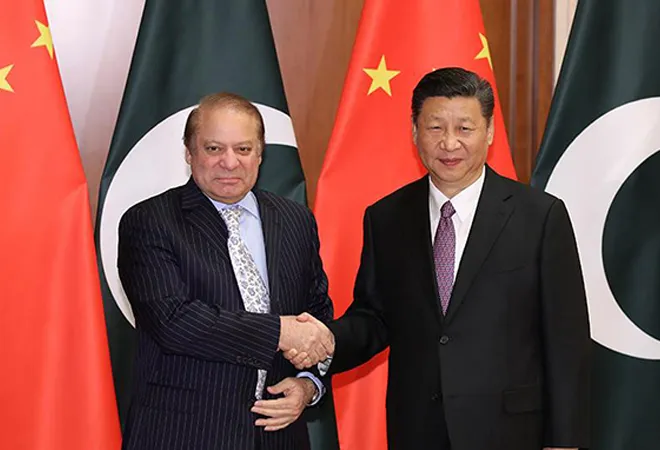External engagement is a factor of internal priorities. This has been an abiding tenet of India’s foreign policy. Which is why it’s puzzling that New Delhi’s policy towards China’s ‘Belt and Road Initiative’ (BRI) is out of touch with the reality of Chinese involvement in India’s own economy.
When the Pakistani daily, Dawn, revealed China’s plans to build Pakistan’s internet backbone via the China-Pakistan Economic Corridor (CPEC) last month (goo.gl/ttMtha), influential voices in India scoffed at Islamabad’s open invitation to Beijing to surveil its society. China is not only creating Pakistan’s fibre optic backbone but it is also developing its digital infrastructure for law and order ‘monitoring and control’.
The chops and the sticks
Just as the CPEC is BRI’s flagship project, the creation of information and communication technology (ICT) ecosystems is the most important element of BRI. In no other area will Beijing’s influence on BRI member states be more pronounced than in cyberspace. Because China can supply digital goods at extremely competitive prices.
India has stayed away from BRI to counter China’s influence on the region’s economies. This concern was eloquently articulated in 2015 by foreign secretary S Jaishankar, who suggested China was looking to “hard wire” norms of governance in Asia.
Digital spaces, in the absence of settled international regimes, are ripe for such hardwiring. Unfortunately, this concern is acute in India’s own digital economy.
Sample these statistics from the Kleiner Perkins Internet Trends 2017 report released on May 31. Four of the top-selling five smartphones in India today are Chinese: Lenovo, Oppo, Vivo and Xiaomi. Their collective market share grew from a modest 15 per cent in 2014 to an astonishing 52 per cent by the first quarter of 2017. More importantly, this growth came at the cost of Indian manufacturers, whose market share declined exactly in reverse, from 45 per cent to 15 per cent in three years.
The report also suggests UC Browser, developed by China’s internet giant Alibaba, has carved out a 50 per cent share of India’s mobile browser market. A 2015 ExIm bank report concluded that India is China’s largest “recipient of capital investment in electronics”. In 2013-14, China accounted for a staggering 58 per cent of all electronic imports to India.
So, one could argue that all roads from China’s digital economy lead to India. Given Beijing’s pervasive reach over India’s IT ecosystem, is it anyone’s case that BRI policies will not affect New Delhi?
The Indian response to China’s domination of its digital economy should not be to ban Chinese products and services. That would only halt the surge in internet penetration in India, and go against the grain of this government’s ‘Digital India’ and ‘Make in India’ initiatives. If anything, China’s technology giants must be invited to build capacity in India, whether in high-end manufacturing, data analytics abilities or through financing R&D in Indian universities. They must be encouraged to be honest interlocutors and to refrain from exploitative trade activities.
Fasten the Belt on the Road
From a strategic perspective, it must be ensured that China’s creeping influence over cyberspace rules does not pose a challenge for India. Indian players should not find themselves shut out by Chinese competition from the region’s digital economies, or at the very least, from their own.
Boycotting the Belt and Road Summit in Beijing last month was New Delhi’s political signal to Asian countries that it is willing to challenge China’s economic influence in the region.
This resistance cannot be premised on providing loans, products or services for the digital economy at par with China, not when India’s own market relies heavily on Chinese players.
It should, instead, be driven by a multilateral effort — led by India and other major economies like Japan, Singapore and South Korea — to set norms of governance for cyberspace in Asia. Such an effort would involve both a high-level understanding on the strategic and military uses of cyberspace, and dialogue between major industrial players on the technical standards and protocols to be adopted by them.
A rule-based ecosystem is the only way to prevent Chinese companies from dumping cheap devices in foreign markets, and gaming regulations to suit their products. But to incubate such an effort, India needs to articulate its own laws on data integrity, encryption, the access for law enforcement to electronic data, the Internet of Things and digital payments.
India’s most effective antidote to Chinese influence in Asia is the creation of an open domestic market, serving the ‘Digital India’ goals of inclusive and affordable connectivity, but secure and reliable enough that other jurisdictions can emulate as their own.
Without a baseline reference for the global standards it seeks to promote, India will also not be able to stem the influence of China in Asian markets.
Foreign policy is decisive in the pursuit of India’s strategic interests. But it is merely an extension of its domestic values and principles. A Digital India serves India’s interest when it is attractive to others and offers solutions others seek to embrace. India’s forceful show of intent by staying away from BRI must be backed by its own strategy to moderate China’s rise.
And that work begins at home.
This commentary originally appeared in The Economic Times.
The views expressed above belong to the author(s). ORF research and analyses now available on Telegram! Click here to access our curated content — blogs, longforms and interviews.




 PREV
PREV



